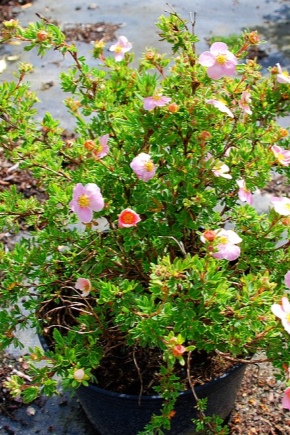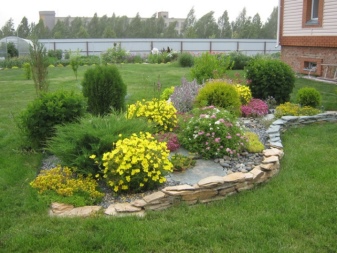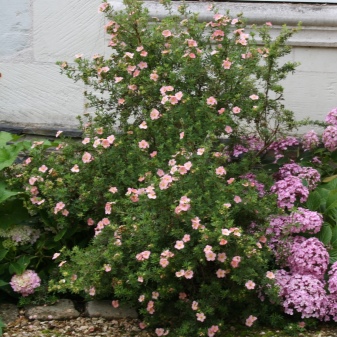Cinquefoil "Lovely pink": description, planting, care and reproduction

Cinquefoil "Lovely pink" is distinguished from other representatives of the genus by a characteristic pink shade of flowers. The plant is also known under the romantic name "Pink Beauty", and pragmatic florists call it Kuril tea. The pink shrub beauty grows in the wild in the northern hemisphere, therefore it is completely uncaptable in harsh weather conditions. Loved by gardeners for a long flowering period.

Description
Lovely pink is a short shrub (up to half a meter in height), with dense emerald foliage and pale pink flowers. All other varieties of Potentilla bloom predominantly in yellow from May to November. The diameter of the plant reaches 80 cm.Over the year, the shoots of the seedling grow up to 15 cm in height.
It has large pink flowers with a bright yellow core, about 5 cm in diameter. They grow in single buds or inflorescences in the form of brushes. The crown consists of small, oblong dark green leaves 2-3 cm long, growing 5 pieces in a bunch.
The long and branched shoots of the northern bush are covered with reddish-brown bark. The rhizome is superficial, branched, consisting of a large number of small processes.




Planting and leaving
The unpretentious Kuril tea is undemanding to the composition of the soil, but loves loose soil. Before planting, the soil is carefully dug up, fertilized with a small amount of lime. Shrub cinquefoil can be planted both in open sunny places and in light shade. In the planting hole, it is necessary to create a drainage from gravel or use expanded clay for the same purpose.


Landing rules
Lovely pink seedlings take root after the snow melts, in early spring. The hole should be twice the size of the root volume of a young bush. You need to be careful with the cinquefoil rhizome, so as not to damage it during transportation to a new place of growth. A distance of 30 cm is chosen between the seedlings, and even better - 50.
Humus, leafy soil and sand are added to the ground left after digging the planting hole in a ratio of 2: 2: 1. Complex mineral fertilizers in the amount of 150 g will be useful. At the bottom of each planting hole, drainage is laid out in a thin layer, sprinkled on top of it in a small amount prepared soil mixture.
The seedling is placed in the center of the planting hole so that its root collar is above the soil level. The rhizome to the top of the planting pit is covered with soil mixture, which is then tamped.


After planting, each seedling must be thoroughly watered and ensured regular watering for a month after rooting. Dry periods during this time will be detrimental to the seedlings.
Watering
A month after planting, watering is carried out 2 times a month. It is imperative to water the pink beauty during a prolonged summer drought. In the spring and autumn period, Pink Beauty Potentilla does not need frequent watering.
Water it with warm water after sunset. One bush will need 10 liters of water. After watering, large sawdust or chips are poured into the area of the trunk circle.


This is done in order to loosen the soil less often and to remove weeds. Due to the superficial root system of the pink cinquefoil, loosening should be carried out with extreme caution, no more than 10 cm deep.
Top dressing
As soon as the snow melts from the ground and it warms up, it is important to apply some kind of complex fertilizer intended for feeding flowering shrubs under the root of Kuril tea. It must contain nitrogen.
In the summer, the shrub also needs to be fed once with phosphorus fertilizers, and in the fall, you will need to fertilize with potassium. Instead of mineral fertilizers, organic fertilizers can be used. The shrub is fed three times a year.

Pruning
For a beautiful crown formation "Pink Beauty" and to stimulate flowering in spring, the shrub is cut off. Processing is carried out from April to May. First, they get rid of dry and damaged shoots, and then long and weak ones.
With a slower growth of the bush, a third of the length of the shoots is cut off, and accelerated growth (over 20 cm per year) is a reason to shorten the length by ½. If necessary, pruning is repeated in the fall, after the shrub has faded.



Preparation for wintering
Only a seedling of the first year of life will not tolerate wintering well. At the end of October, it is watered and covered with a thick layer of mulch in the area around the trunk. Shoots and leaves are treated with Bordeaux liquid. The procedure is aimed at preventing the development of fungal diseases under the pressure of the snow. Then you can collect the branches in a bunch and wrap up with some covering material. Adult plants "Lovely Pink" are not afraid of frosts up to a temperature of 30'C and they do not need preparation for wintering.


Reproduction
Lovely pink cinquefoil can be propagated seeds, layering, cuttings and the method of dividing the bush.
- The seeds are germinated at the end of winter, in February, by planting them in seedling boxes under a film and strictly controlling the temperature, which should be at the level of + 18-22? С. The first shoots are expected to appear in about 20 days. It is necessary to transplant seedlings into open ground only for the next year, and count on flowering no earlier than two years later.
- Pink Beauty is easy to propagate by dividing the bush in the fall, right after the plant has faded. Cinquefoil must be at least 3 years old. An adult plant is dug up and the rhizome is divided into 2 or 3 parts. It is necessary that each separated bush has at least a couple of shoots. The cut must be greased with ash. The separated shrubs will root in the new location immediately.
- Potentilla of this variety is propagated by cuttings in the middle of summer, cutting off a young, fresh shoot and dividing it into 15 cm pieces. At one end, the separated part must be put into Kornevin's solution for an hour. After that, the cuttings are planted, choosing a place in the shade. Top them need to be covered with glass jars. After 20 days, the cutting will take root.
- Kuril tea is a plant that takes root easily by layering. In the green shoot, the bark is cleaned in the center so that the cleared area does not exceed 0.5 cm. With this place, the shoot is pressed against the soil, after which it remains only to regularly moisten it. A month later, roots break through at the clutch site. Then it's time to separate the young plant from the mother bush and transplant.




Diseases and pests
Pink Beauty cinquefoil is not afraid of most garden pests. But the plant can infect a fungus, accompanied by spotting, rust, or the appearance of powdery mildew. Noticing damage on the leaves in the form of yellow or whitish spots, signs of wilting or twisting, you need to immediately treat the shrub with a liquid fungicide (similar to Bordeaux liquid).
For the prevention of fungal infections, foliar treatment of the Lovely pink shrub with a weak solution of boric acid or manganese is desirable. A disinfecting solution is watered in the area of the trunk circle.
Among all insects, only scoops who love to taste its lush greens do not shy away from pink Potentilla.
Strong chemical agents of the latest generation are used against small pests. Since the pink beauty cinquefoil does not bear fruit, it can be treated with chemistry at any time.


Application in landscape design
Lovely Pink is a perennial that has been in bloom for three decades. Therefore, it is necessary to painstakingly choose a place to plant it. When landscaping personal plots or flower beds, several types of Potentilla are used. Everyone has their own time of flowering, so each season the garden plays with different colors.


Shrub cinquefoil is often used in landscaping city parks and gardens. The shrub is great as a natural curb or decorative hedge. It looks wonderful next to ornamental shrubs and trees. The pink beauty is also beautiful, surrounded by conifers, evergreens. It is advisable to place the cinquefoil near rockeries, an alpine slide or on the edge of a forest. On flower beds, Lovely pink should give the central place in the composition.



A lush ornamental long-lived shrub is suitable for those gardeners who do not have time to comprehend the intricacies of caring for cultivated plants. Cinquefoil will take root and grow in almost any Russian region, enduring the winter frosts without loss.


With minimal effort, you can plant greenery in a garden plot or a park alley for many years. Lovely Pink grows equally well on city streets and in rural areas.
For a brief overview, a description of the characteristics of the Potentilla shrub Lovely Pink, see the next video.



































































The comment was sent successfully.